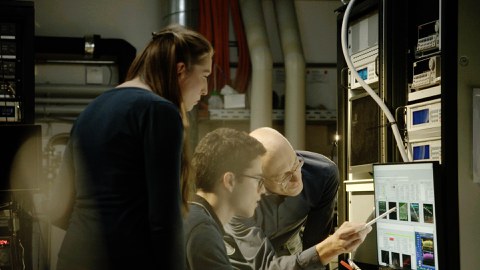Prof. Matthias Vojta
© Camera: Avanga, post production: Janett Hanitzsch
The global competition for quantum technologies is well underway. Materials that exhibit exotic phenomena play a crucial role in this respect. On top of the game: The Cluster of Excellence ct.qmat – Complexity and Topology in Quantum Matter. Nearly 400 scientists from 38 countries are exploring quantum materials that, in the future, will be able to achieve such feats as conducting electricity without loss and storing gigantic amounts of information. They reveal their exotic phenomena under extreme conditions such as ultra-low temperatures, high pressure or strong magnetic fields. If these special properties can be made applicable under everyday conditions, this will be the basis for revolutionary technical applications.
The Cluster of Excellence has succeeded in developing a laser network as small as a grain of sand that functions as one single laser. This advancement could be used to boost the performance of certain microlasers, which are already firmly established in cell phones, fiber-optic networks and other technologies we use every day.
ct.qmat – a joint research collaboration between Technische Universität Dresden and Julius-Maximilians-Universität Würzburg – is the only German cluster that traverses federal state boundaries. This cutting-edge research is closely interlinked with four renowned Dresden institutes of the Max Planck Society, the Helmholtz Association and the Leibniz Association.
Four questions for Prof. Matthias Vojta
What do you research?
My concentration is in solid-state physics. Solid-state physics is the branch of physics concerned with solid materials and their phenomena. Quantum materials are particularly fascinating for us. These materials are the ones whose quantum effects lead to key physical phenomena. Many of these will be crucial for the technologies of the future.
What does excellence mean to you?
First and foremost, excellence means outstanding research – that we can compete on a global scale. Excellence means superb teaching – that we provide future generations with a first-rate education. And let’s not forget the importance of attracting the brightest minds to our university.
What makes Dresden special as the home of your research?
What makes Dresden a special research hub is its exceptionally strong network of research institutions, to which TU Dresden belongs. In solid-state physics, we cooperate closely with our colleagues from the Helmholtz, Max Planck and Leibniz Institutes. This is one of the reasons I came to Dresden twelve years ago. I really enjoy exchanging ideas with my colleagues on a daily basis.
What makes TU Dresden stand out?
It’s fun to be at TU Dresden, in particular because the university has made an enormous developmental leap in the past ten years.


